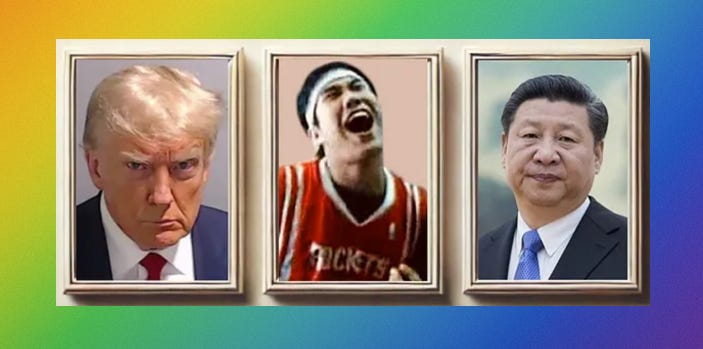Not Zero-Sum: Perspective of an Ordinary Chinese American
In the era of Trump/Putin/Xi, an ordinary Chinese American's hope for solidarity (Epilogue)

← Chapter Twelve: Seeking the Truth
Epilogue
The events of the book cut off at Oct 2022. Given my glacial pace of writing, I found it necessary to set a hard date, dodging the pitfall of after-the-fact revisions, although one movie reference from 2023 did slip in.
During Oct 2022, Xi was poised to win his third term in a rubber stamp vote, pushing China into a new era of uncertainty. Twenty-five months later, the other shoe dropped in America. I will try to catch up to the forces reshaping the global landscape.
In the two years since Oct 2022, China’s economy has stalled, as consumption crawled out of its hiding places during the pandemic. The bursting of the real estate bubble fulfilled the inevitable; the suppression of the tech industry’s growth crossed into the territory of questionable strategy; and the harassment of foreign companies (and their investments) dealt a self-inflicted blow to the host nation. The combined effects led to high unemployment among the youths—20% reported—but because of China’s censorship apparatus, bad news always come paired with rumors of even worse numbers. The flattening of GDP expectations underscored both Xi’s lack of expertise on the economy and one inherent dilemma faced by advisors in a dictatorship—do you submit input to fix the economy or curry favor with the supreme leader?
While President Biden conspicuously declined, his policies remained steady, navigating the landmines of the pandemic, inflation, the Ukraine War, the banking crisis, and the Middle East crisis, and keeping the American economy afloat, even as grocery costs stubbornly trended upward. The decision to run for reelection will be scrutinized, but the magnanimity that followed could have been the self-sacrifice that the world desperately needed—had it not been diminished by the eventual outcome of the election.
To me, the 2024 election is a referendum on the state of the US. In the tug of war of impulses, the good side doesn’t always prevail, especially under the strain of higher prices and temptations of bad influences aptly described as “cultural heroin.” While America seemed to indulge in a version of high in the aftermath of the election, it was our friends and allies who lamented the latest lapse in responsibilities and commitments, wondering whether it’s not the end of the era of American leadership. As the bastion of shared values knowingly elected the transactional candidate, the US and China looked increasingly alike, and not in a good way.
Contrary to popular belief, the outcome of the election is not necessarily terrible for US-China relations. Certainly, the range of outcomes has expanded. Additional tariffs, if enacted, will disproportionally hurt the ordinary people of both nations. But as Trump’s flip-flop on the TikTok ban has shown, he governs by the principle of self-interest that doesn’t necessarily equate to America’s interest, or against China’s interest. So rather than a narrower focus on US-China, I’m troubled more by the broader decay of our foundations: the perversion of truth and rule of law, the rise of yes-men, the auctioning of policies to the highest bidder, and the wholesale abandonment of higher aspirations, and along with it, American international leadership. I worry that the US-Taiwan alliance will be reduced to Taiwan’s chip manufacturing capabilities. I worry what it means for the Ukrainian people, the Palestinian people, the Americans who question if Trump administration even sees them as human beings, for all of us—minorities and vulnerable—as the world takes a turn for the worse.
I hope I’m wrong. I hope the next four years will be the most boring years, with little impact on long-term trajectories. I hope JD Vance is guided not only by the beacon of self-advancement, but also by the desire to combat drug addictions. I hope that when Elon Musk jumped up and down on the stage at a Trump rally, he was pumped not only by thoughts of unfair advantage in AI, but also the chance to influence climate change.
I hope we hold onto hope.
In the city of Seattle where I now live, November marks the return of the short, cold, gray, rainy days, where darkness falls just after 4pm, and steady tears from the sky baptize those who brave the elements.
I think these are the character-building days. In the face of the uncertainty ahead of us, I’m reminded that visions don’t become realities in our head, but rather it takes feet on the ground, incremental steps, collaboration with others, and the test of time. Before Obama became president, he was a grassroots community organizer, advancing one handshake at a time, building coalitions around common goals. While I don’t know what the next four years hold, I do know that the vision of a world based on the bond of the people—rather than the raw power of the few—is worth fighting for.
During the nadir of the Dotcom crash, Jack Ma once said “Tonight is horrible, tomorrow night will be even worse, but the day after tomorrow will be beautiful.” As we head into the depth of the night, I hope we find the resolve to see the beauty in this world.
<The End>
If you have made it all the way to the end, we are practically family. As sworn kin, I would love to hear from you (not.zero.sum2025@gmail.com).
As always, thank you for reading. Share with others who may enjoy this topic, and I’m forever in your debt.
JW
Epilogue End Notes:
Trump’s flip-flop on TikTok ban: “What China’s Leaders Grasp About Another Trump Term” by Rush Doshi, The New York Times (https://www.nytimes.com/2024/10/14/opinion/trump-china-election.html)




Lost Decade in Hong Kong and China at this stage.